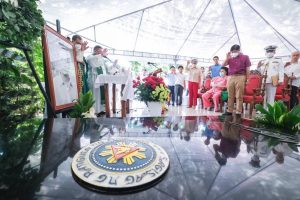Human rights activists in the Philippines have expressed outrage over a move by President Ferdinand “Bongbong” Marcos Jr. to proclaim the birthday of his late father, the former dictator Ferdinand E. Marcos, a special holiday in the family’s home province.
Marcos authorized the declaration of the non-working public holiday in Ilocos Norte province today for celebrations marking the 105th anniversary of the birth of Marcos Sr., which fell yesterday (Sunday).
“It is but fitting and proper that the people of the Province of Ilocos Norte be given full opportunity to celebrate and participate in the occasion with appropriate ceremonies, subject to the public health measures of the national government,” the proclamation stated, according to The Inquirer. As if to exemplify the influence of the Marcos clan in Ilocos Norte, the proclamation was posted on Facebook by Ilocos Norte Governor Matthew Marcos Manotoc, a grandson of Marcos Sr.
According to The Inquirer, Ilocos Norte is holding four days of celebrations that began on September 8, with the Bongbong Marcos Cup 2022, a four-day practical shooting competition. Among the other festivities are a thanksgiving Mass, a debate competition, and a “Marcos Fiesta” concert.
Marcos was toppled from power by mass public demonstrations in 1986 and died in exile in Hawaii three years later. Far from facing accountability for his widespread corruption and human rights violations, however, the Marcos family was allowed to return to the Philippines and have gradually returned to political prominence – first in Ilocos Norte, then at the national level. The comeback that reached its dizzying conclusion with Marcos Jr.’s landslide victory in the elections in May.
Critics say that the victory was greased by a well-funded campaign of social media disinformation that sought to whitewash the image of the Marcos family and present a revisionist view of the Marcos dictatorship as a forward-looking era of stability and plenty.
Among these critics were human rights groups and survivors of Marcos’ 21-year reign, including the repressive period of Martial Law between 1972 and 1986, in which thousands of government critics were arrested, tortured, and in some cases killed by the security forces. In an online news conference held on Saturday, a number of survivors of the Marcos dictatorship denounced the holiday proclamation as a slap in the face.
Satur Ocampo, who was arrested in the 1970s and tortured under Martial Law, criticized the commemoration being held at a time “when the victims of the dictatorship have not even attained justice despite our campaign, plundered wealth has not been returned and there isn’t even a hint of apology up to now.” Gwendolyn Pimentel-Gana, a former member of the government’s Commission on Human Rights, said that the proclamation of the day off was “another step to revise history.”
The Inquirer quoted Bonifacio Ilagan, a Martial Law survivor and convener of the Campaign Against the Return of the Marcoses and Martial Law, as saying that while the president’s move only applied in Ilocos Norte, it amounted to “whitewashing and covering up the hellish memory that (Ferdinand) Marcos Sr. and his ilk wrought on the nation.”
Marcos Jr.’s predecessor, Rodrigo Duterte, also authorized the late president’s birthday to be observed as a holiday in Ilocos Norte. In 2017, Duterte signed a proclamation, declaring September 11 of that year as a special non-working day in commemoration of Marcos’ birth. The proclamation stated that Ilocanos should be given the opportunity to commemorate Marcos’ “life and contributions to national development as a World War II veteran, distinguished legislator, and former president.” In 2020, he kicked the decision to the Philippine Congress, which duly voted for the holiday to be celebrated in Ilocos Norte that year.
In their news conference, activists announced that they would hold a series of protests on September 21 to mark the 50th anniversary of the declaration of Martial Law in 1972.

































